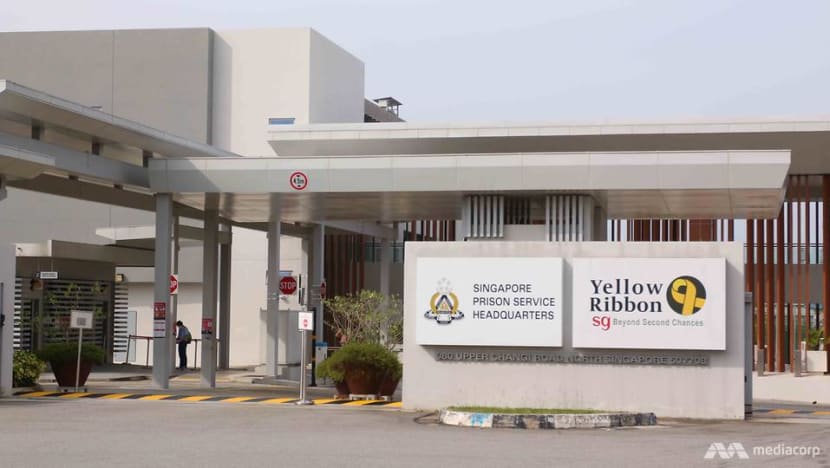MPs call for greater effort to reintegrate ex-inmates, find 'meaningful' employment as stigma remains 'prevalent'

FILE PHOTO: Office workers shaking hands. (Photo: iStock)
SINGAPORE: A Bill to allow prison inmates to take on skills training and education outside prison, in addition to working, towards the tail-end of their sentence was passed in Parliament on Tuesday (Jan 11).
Under the Prisons (Amendment) Bill, a new scheme called the Employment Preparation Scheme (EmPS) will enhance inmates’ employability and help them secure jobs after release.
The Bill will also facilitate the Singapore Prison Service’s operations and administration.
This includes allowing the Minister for Home Affairs to make regulations related to inmates’ communications to uphold security and good order of the prison; explicitly protecting officers from liability for acts and omissions done in good faith and with reasonable care; and granting power to prison officers to obtain information.
During the second reading of the Bill on Tuesday, several Members of Parliament (MPs) called for more to be done to help ex-offenders. Their concerns include helping ex-offenders find meaningful employment, providing incentives to encourage employers to hire them, and addressing the discrimination and stigma that they face.
ENSURE SUPPORT FROM “GENUINE” EMPLOYERS
To ensure successful rehabilitation of inmates via the EmPS, Mr Yip Hon Weng (PAP-Yio Chu Kang) said there is a need to ensure participation from “genuine employers”.
He called for employers to provide specific training plans and remuneration schedules to the Singapore Prison Service, and suggested that there should be regulations and penalties for “errant employers”.
“Employers who abuse the system or refuse to abide by the regulations are a potential concern … A first poor employment experience can be disheartening for inmates. It deprives them of a valuable integration opportunity,” he said.
Adding that “meaningful employment” would help an ex-offender reintegrate better, Mr Sharael Taha (PAP-Pasir Ris-Punggol) added that society must “be mindful not to dishearten these individuals” by exposing them to discrimination.
“It is not unheard of that ex-inmates face a tough time landing a job even with proper skills and qualifications. Despite the best efforts of many inmates who want to turn over a new leaf, discrimination and stigmatisation remain a reality,” he said.
Mr Sharael suggested incentivising employers to encourage them to consider employing ex-inmates.
This sentiment was echoed by Mr Desmond Choo (PAP-Tampines), who suggested offering a “one-off bonus” when an employer hires an inmate upon their completion of the EmPS with the company.
Mr Choo also said there may be “scope to investigate enhancing the Jobs Growth Initiative (JGI) for ex-offenders”, such as with the provision of Government support running for a period longer than the current 12 months.
MORE EFFORT NEEDED TO REINTEGRATE, REHABILITATE
More effort should be made to rehabilitate and reintegrate inmates, even if they have shown themselves to be unresponsive, noted Nominated MP Raj Joshua Thomas.
“In fact, it may well be that the offenders who need these schemes most are precisely those who appear less responsive as they may have the most difficulty reintegrating and the highest risk of re-offending,” he said.
Mr Thomas also called for more support for elderly ex-offenders returning to society and inmates who have been incarcerated for extended periods of time, as both groups may face greater challenges finding employment.
Mr Melvin Yong (PAP-Radin Mas) added that technology will seem “foreign” to these inmates who’ve been in jail for lengthy periods when they’re released into “a new world”.
He suggested deploying digital ambassadors to provide “technology familiarisation sessions” to better prepare these inmates for life outside prison.
Mr Yong added that more can be done to help place ex-offenders into “manpower-starved sectors”, but expressed concern that certain jobs were excluded from them.
“Certain jobs such as those in the security sector, or those that require approval from the police to enter restricted areas such as our ports and the airport, are automatically excluded from ex-offenders due to their past convictions,” he said.
“I hope that the relevant authorities will continue to review such restrictions and exercise more flexibility so that we can help our ex-offenders access some of these jobs.
“Ex-offenders have served their sentence. Let us reduce the stigma and not let their past actions continue to cast a shadow over their future.”
Moreover, despite the existing career coaching, career guidance and job facilitation programmes under the Yellow Ribbon Project, not all ex-offenders may be aware how to take up these schemes meaningfully, said Ms Nadia Samdin (PAP - Ang Mo Kio).
To increase the chances of job retention and employment in the long run, she called for the Government to consider allocating resources for “medium-to-long term support” after an inmate’s release.
FINANCIAL SUPPORT
MPs also raised concerns about helping ex-inmates with financial matters.
Many ex-offenders also need financial support upon release, and would need to work “rather than invest in training and education”, said Mr Choo, and called for a training allowance for inmates who take up training and education under the EmPS.
On the other hand, Mr Leon Perera (WP-Aljunied) pointed out that ex-offenders may find it difficult to set up bank accounts, which may hinder their ability to find stable jobs.
He cited the collaboration between the prisons and POSB that was started in 2015 to facilitate the setting up of bank accounts by ex-offenders upon release from prison, and asked whether similar collaborations could be made with other banks.
Noting that existing literature suggests a link between criminal activity and financial distress, Mr Perera asked whether the Government could subsidise costs of courses that inmates take up to upgrade their skills.
“If they were to complete their studies and after release, secure a job and do not demonstrate recidivism for a certain period of time, would the Government consider a scheme whereby their student debts can be forgiven?” he added.
“Such a scheme would incentivise inmates to take up courses of study while in prison and may also play some role in reducing recidivism.”
Mr Perera also suggested that ex-offenders be exposed to financial literacy training before release to ensure better financial management.
“Perhaps MoneySENSE, the national financial education programme, can be brought in to play a role here,” he said.
TACKLE PUBLIC DISCRIMINATION
MPs also addressed prevailing public stigma against ex-offenders, despite best efforts to reintegrate them.
While people may agree on the need to train and reintegrate ex-offenders into society, it doesn’t necessarily translate into willingness to attend classes or work in the same workplace as them, noted Mr Yip.
“I seek clarification on whether participating inmates will attend classes together with the public,” he said.
“If so, will there be ways to remove identifiers associated with participating inmates, such as not requiring the wearing of prison attire, or wearing electronic tracking devices at a spot where it is not visible?”
Ms Nadia Samdin (PAP-Ang Mo Kio) added that the EmPS alone “cannot change employers’ or colleagues’ perceptions of, and sometimes prejudice against, ex-offenders”, and stigma remains “prevalent”.
“The work to manage negative societal attitudes is endless, but I do hope and urge those in and out of the house today, to address any personal prejudices you come across and help unlock the second prison,” she said.
“Many (ex-offenders) share that in the past, it was always someone else visiting them and their families that helped them along their post-release journey. Allowing them to cultivate stronger ties with their neighbours and own communities on the ground gives them a chance to see things from a different perspective, make amends, and to feel like they too can have purpose and help others.”

"THERE IS ROOM FOR IMPROVEMENT"
In response to MPs’ concerns about employment of ex-inmates, Minister of State for Home Affairs Muhammad Faishal Ibrahim touched on several points.
For starters, inmates are kept abreast of digital changes. Since 2019, Yellow Ribbon Singapore (YRSG) has offered the SkillsFuture for Digital Workplace course for inmates serving their sentences in the community.
“The curriculum teaches the use of internet banking and payments, e-communication platforms, government e-services, and basic cyber security. YRSG is also developing tiered training pathways for inmates to gain digital skills which will commence in Q2 of 2022,” said Assoc Prof Faishal.
Inmates who are working during the EmPS will have a career coach for up to 12 months to help them adapt to job demands and the workplace environment.
This support will continue after the EmPS if the inmate’s emplacement period is less than 12 months.
“The employer is also supported by the career coach who helps the inmate and employer understand each other’s expectations and perspectives. The career coach engages the employer and the inmate’s supervisor regularly and assists to resolve any work-related issues,” added Assoc Prof Faishal.
“In doing so, the employer can better understand any unique need of the inmate and adopt a more effective management style.”
Addressing Mr Yong’s suggestion on opening up jobs in security industries to ex-inmates, Assoc Prof Faishal said that there must be a “balance between rehabilitation and public safety”.
“For example, someone convicted of kidnapping would not be allowed to be a taxi driver. Different occupations and sectors have their specific considerations and thus restrictions on hiring ex-offenders. These restrictions are deemed necessary to protect the interests of the public,” he said.
Nonetheless, discrimination against inmates remains frowned upon. Inmates are not compelled to reveal their ex-inmate status to avoid further stigmatisation, said Assoc Prof Faishal.
If an employer is reported to treat employees unfairly because of their criminal records, YRSG may pause or even cease the partnership with the employer, he added.
“If an inmate experiences discrimination or biased treatment at work because of his criminal records, the career coach will engage both the employee and employer to resolve the issue. If necessary the career coach may also advise the inmate to seek help from the Tripartite Alliance for Fair and Progressive Employment Practices (TAFEP).”
More serious cases that may breach employment laws may be reported to the Ministry of Manpower for investigation, he said.
Assoc Prof Faishal noted that education, skills training and employment play a very important role in inmates’ rehabilitation.
“The Government strives to strike a balance between protecting the public and providing ex-offenders the opportunity to live, work and learn in the same way as other members of the society. Besides enhancing inmates’ employability, it is our hope that inmates can form positive pro-social networks, assimilate into society, and reduce the chances of reoffending.”
Agreeing with Mr Perera’s point that the five-year recidivism rate is about two times higher than the two-year recidivism rate, Assoc Prof Faishal said there is room for improvement.
“That is why we want to implement new programmes such as the EmPS to improve these rates. However SPS (Singapore Prison Service) and YRSG cannot do this alone over the longer time frame. We need even stronger support from this House, families, the community, and an accepting society,” he said.
“We aim to promote a more accepting society that is willing to offer ex-offenders a second chance to start afresh. Ultimately, the safety and security of society is best served when ex-offenders successfully rehabilitate and reintegrate into society as contributing members.”
The Bill was first tabled in Parliament on Nov 1, 2021.















